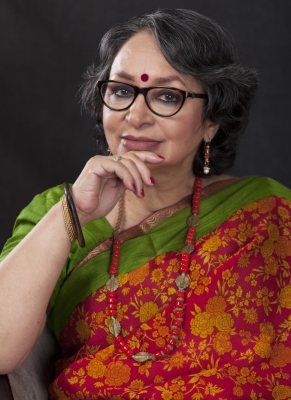
Deepa Agarwal was born in the beautiful small town of Almora in Uttarakhand, and thanks to her book lover parents – her father, a doctor, and her mother, a school teacher, she became an avid reader. “My parents read to us regularly and provided us with a variety of books. I became such an avid reader that it was inevitable that I end up writing my favourite in school and I always entered any essay competition and often won prizes. I consider the authors that I admire my source of inspiration,” says the writer. She is one of India most prolific writers for the young, with 30 books in three decades of writing! Two of them have been out this year itself – “Blessed” and “Friendship Stories”. Let’s find out how she creates her books.
Writing tips for budding writers
Deepa Agarwal says that her mantra for good writing stems from a whole lot of reading! So, yes, read a lot. “The more you read, the better writer you will be,” she explains. Besides that, she also:
- Maintain an ideas notebook. Some story idea but are not in position to write times you get a story idea but are not in a position to write it. Save your ideas to develop them when you have time.
- Keep a diary. As in sports and music, good writing needs a lot of practice. Keeping a diary means you are writing every day. Record incidents that made an impression on you and your emotional response to the. This could be valuable material in the future.
- Remember that each story begins with a problem the main character has to solve. She/he will receive help from friends and face opposite from enemies. The attempts to solve this problem create the story.
- “Where”, “when”, “who”, “why”, and “how”, are important questions in your story and you should provide this information of your readers.
- The main characters need to be developed in debit to be credible. Show action rather than report it.
- Dialogue should be natural to the characters.
When you have completed your story, revise, revise and revise!
And there’s not a moment to waste, seems to be the guiding philosophy for Deepa. “ I have two middle readers in the pipeline. One is a retold collection titled ‘Mahabharata Stories’ being published by HarperCollins India. The other, which will be out early next year, is a non-fiction, an account of the exploration of Tibet by legendary surveyor Nain Singh Rawat , titled ‘Journey to the Forbidden City’, to be published by Puffin.”
The writer’s routine
With a repertoire like that, Deepa Agarwal does have a disciplined writing routine. Most days she tries to settle down to her writing around 11.30 a.m., takes a short break for lunch and works for a couple more hours in the afternoon. “Many of my ideas come from real life – incidents that leave a mark or overheard conversations. Sometimes inspiration comes in the form of an opening sentence or a character. My recent nook ‘Blessed’ was sparked off by the image of girl disappearing into a hidden space. For longer works of fiction, I create a plot outline to stay on course, but for my short stories, I let the characters develop on their own and choose their actions. Poetry, of course, is usually spontaneous,” she reveals. That’s interesting don’t you think-having a different working style for different branches of writing?
Deepa Agarwal’s books
- Three Days to Disaster
- Anita and the Game of Shadows
- The Tricky Tales of Vikram and the Vetal
- Caravan to Tibet
- Folk Tales of Uttarakhand
- Chandrakanta
- Rani Lakshmibai
- Write Right
- Rajula and the Web of Danger
- Ghost Stories Vol I
- Chanakya, the Master of Statecraft
- Spinning Yarns: The Best Children’s Stories from India
- The Wish-fulfilling Cow and Other Classic Indian Tales
- Go, Girl, Go!
- 100 Great Poems for Children
- Words to live By: The Best of Indian Non-fiction for Children
- Listen, O King!: Five-and-Twenty Tales of Vikram and the Vetal
- Best Stories from Around the World
- Scholastic Book of Hindu Gods and Goddess
- Sacked: Folktales You Can Carry Around
- Blessed
- Friendship Stories
- A Capital Adventure
- Everyday Tales
- Traveller’s Ghost
- The Hunt for the Miracle Herb
- Ghosts Everywhere
- The Hilltop Mystery
- Not Just Girls!
Bet you didn’t know that though Deepa writes in English, she only began to speak English fluently at the age of seven when she went to boarding school.
Bet you didn’t know that (this may sound positively pre-historic, she confesses) she had never dialed a number on a telephone till she was 16! They lived in a very small town had no telephone at home.
Picture Credit : Google

